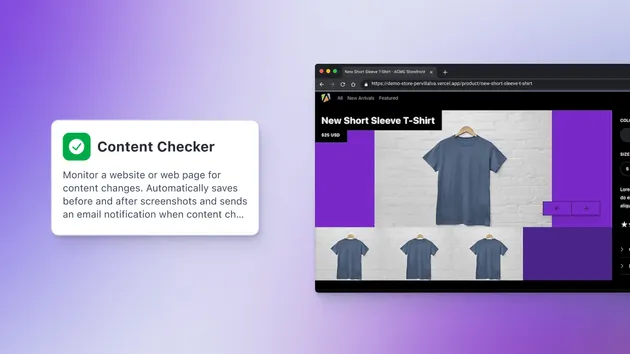Results Checker
Pricing
Pay per usage
Results Checker
Check the results of your scrapers with this flexible checker. Just supply a dataset or key-value store ID and a few simple rules to get a detailed report.
0.0 (0)
Pricing
Pay per usage
8
Total users
29
Monthly users
1
Last modified
4 years ago
Results Checker
Overview
Results Checker is an Apify actor that helps you find inconsistencies in your output and essentially fix bugs.
- Loads data from Apify Dataset, Key Value store or just as an arbitrary JSON and runs a check on each item.
- The check takes seconds to a maximum of a few minutes for larger datasets.
- Produces a report so you know exactly how many problems are there and which items contained them.
- It is very useful to append this actor as a webhook and you can easily chain another actor after that to send an email or add a report to your Google Sheets to name just a few examples. Check Apify Store for more.
How it works
- Loads data in batches into memory (Key Value store or raw data are loaded all at once).
- Each item in the batch is scanned.
- Each field is checked with a predicate. Extra fields are considered bad (the whole item is marked bad).
- Each field is also checked for truhly value for a separate
totalFieldCountsreport. - A report is created from the whole batch.
- Between each batch, the state of the actor is saved so it doesn't have to repeat itself on restart(migration).
- In the end, the report from all batches is merged together and saved as
OUTPUTto the default Key Value store.
Usage
- For smaller datasets you can use 128 MB memory but if it fails with an 137 error code (out of memory), you will need to increase it. Add more memory for increased speed. Maximum effective memory is usually about 4 GB since the checker can use just one CPU core.
- If the report would be too big to be saved or opened, just run a few smaller runs of this actor using
limitandoffsetparameters.
Compute units (CU) consumption examples (complex check & large items)
- 10,000 items - 0.005 CU (few seconds)
- 100,000 items - 0.05 (one minute, computation is instant but loading items take time)
- 1,000,000 items - 2 CU (requires up to 16 GB memory to hold data, better to split into smaller runs - this may get fixed in future version)
Input
This actor expects a JSON object as an input. You can also set it up in a visual UI on Apify. You can find examples in the Input and Example Run tabs of the actor page in Apify Store.
apifyStorageId<string> Apify ID of the storage where the data are located. Can be ID of a dataset or key-value store or crawler execution. Key-value-store requires to set also arecordKeyYou have specify this orrawDatabut not bothrecordKey<string> Record key from where it loads data in key value store. Only allowed whenapifyStorageIdpoints to a key value storerawData<array> Array of objects to be checked. You have specify this orapifyStorageIdbut not both.functionalChecker<stringified function> Stringified javascipt function returns an object with item fields as keys and values as predicates (functions that return true/false). Check Function Checker section. Requiredcontext<object> Custom object where you can put any value that will be accessible in functional checker functions as third parameter. Useful for dynamic values coming from other actors.identificationFields<array> Array of fields(strings) that will be shown for the bad items in the OUTPUT report. Useful for identification (usually URL, itemId, color etc.).minimalSuccessRate<object> You can specify minimal success rate (0 to 1) of any field. If the success rate will be higher than this, the field will not be count as bad field. This needs t obe an object with fields as keys and success rate as values. Default Empty object (all values should have success rate 1 (100%))limit: <number> How many items will be checked. Default: alloffset: <number> From which item the checking will start. Use withlimitto check specific items. Default: 0batchSize: <number> You can change the number of loaded and processed items in each batch. This is only needed to be changed if you have really huge items. Default: 50000maxBadItemsSaved: <number> Sets how big report you get for each unique combination of bad fields. Keeping this small and running it again after fixing some is the best approach. It speeds up the actor and reduces memory need.
Reading from webhook
You can call this actor from Apify webhook without a need to pass to change the webhook payload. The actor will automatically extract the default dataset.
Functional checker
A checker that uses functions allows us to write custom and flexible checks in plain javascript. Let's look first on some examples of the checker.
Very simple:
This checker ensures the url is in the correct format most of the time. It also allows an optional color field. All other extra fields will be marked bad.
You can see the name of the parameter doesn't matter as it is just a regular javascript function. The object key as url and color in this example needs to match exactly.
Medium complexity Checks more fields.
Complex
Let's look at some advanced checks we did here:
- You can pass a second parameter
itemto the predicate (checking function) so that you can always have a reference to all other fields. In this case, we first checked thatpriceis a number. ThensalePricecan be eithernumberornullbut cannot equal topriceso it only shows up if there is a real discount, otherwise, it should staynull. - You can pass a third parameter
contextwhich is any object you passed via actor input. In this case we may passcontext.onlyShirtswhich means the checker will check that we got only theshirtscategory and nothing else. Ifcontext.onlyShirtsis not passed, then we just check thatcategories_jsonis a valid array.
- If the predicate always returns
true, it means this field can have any value, evenundefinedso it can be absent and still pass too.
Important: You should always define your predicates in a way that cannot crash. For example (images) => images[0].includes('http') has ways to crash. The correct definition is (images) => Array.isArray(images) && typeof images[0] === 'string' && images[0].includes('http'). An error occuring in the predicate will crash the whole actor because the check cannot be valid any more. If it happens, the problematic item will be logged so you can correct the check.
JSON Schema Checker
To be added in the next version
Reports
At the end of the actor run, the report is saved to the default Key Value store as an OUTPUT.
It contains:
totalItemCount,badItemCount,identificationFieldsbadFieldsObject that shows how many times each field was bad. This way you instantly see your problematic spots.extraFieldsObject that shows how many times an extra field was encountered.totalFieldCountsObject that shows how many times a field was seen in the dataset. Field is considered seen if its value is notnullor''(empty string). It is like JS truthy value but considers0valid.badItemsLink to another record with an array of all bad items. Thedatadiplay their content whole or just withidentificationFieldsplus bad fields to shorten the length. Also for each bad item, you will see exactly thebadFields(that didn't match the predicate or were extra) anditemIndexto locate your item in the dataset.
Detailed bad items report from the previous link
Minimal success rate
Sometimes you know that some items will always fail the check due to external factors (like website being broken). This actor let's you define minimalSuccessRate for a field. If that field passes more checks than minimalSuccessRate, it will not be present in badFields or badItems reports.
There are 2 options how to set minimalSuccessRate:
As input parameter
Provide an object to the input with config for the fields that are allowed to have some % of fails. All values are between 0 and 1.
Inside functional checker
You can also define it directly in your checkers which gives you even more flexibility. In that case, you have change the checkers from function to objects that hold these check functions.
You can also have more checks for each field. This is example of one field that has 2 checks, one stricter and one general that should be always correct (if you don't provide minimalSuccessRate, it has to be always correct).
The keys any and exact are completely up to you and are used for identification. The badFields then have the same structure as you provide in your checker (instead of just plain number).
Epilogue
If you find any problem or would like to add a new feature, please create an issue on the Github page.
Thanks everybody for using it and feedback!



